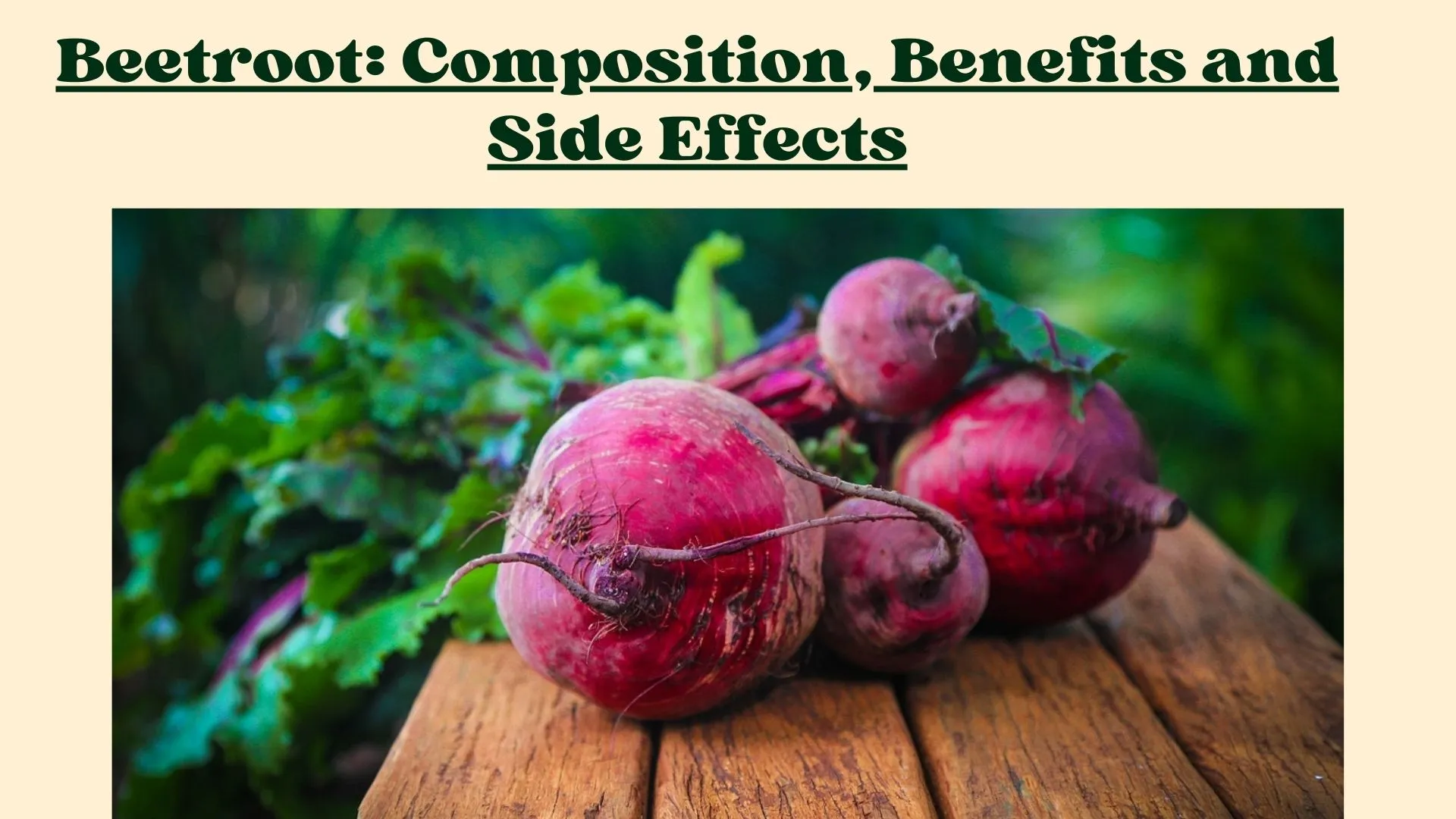Beetroot, scientifically known as Beta vulgaris, is a versatile root vegetable referred to as red beet, table beet, or simply beet. Rich in essential nutrients like fibre, folate (vitamin B9), manganese, potassium, iron, and vitamin C, beetroots offer a range of health benefits. These benefits include enhanced blood flow, reduced blood pressure, and improved exercise performance, largely attributed to their high inorganic nitrate content.
Beetroots can be enjoyed raw, but they are commonly cooked or pickled. Additionally, the nutritious beet greens, the leaves of the beetroot, are also edible. Available in various colours, such as yellow, white, pink, or dark purple, there are diverse types of beetroots, each with its distinct characteristics.

Nutritional Composition of Beetroot
Beets are primarily composed of water (87%), carbohydrates (8%), and fibre (2–3%). A cup of boiled beetroot contains fewer than 60 calories, with various essential nutrients, including protein, carbs, sugar, and fibre.
Carbohydrate Content
Both raw and cooked beetroot offer about 8–10% carbs. Simple sugars, such as glucose and fructose, constitute a significant portion, making up 70% and 80% of the carbs in raw and cooked beetroots, respectively. Additionally, beetroots contain fructans, classified as FODMAPs, which may cause digestive issues for some individuals.
Rich in Fiber
High in fiber, beetroots provide about 2–3 grams in each 3/4-cup (100-gram) raw serving. Dietary fibre is integral to a healthy diet and has associations with a reduced risk of various diseases. Incorporating beetroots into meals contributes to overall fibre intake, supporting digestive health and overall well-being.
Nutrient-Rich Beetroots
Beetroots stand out as a rich source of vital vitamins and minerals that contribute to overall health and well-being.
Folate for Tissue Growth
Folate, a key B vitamin in beetroots, plays a crucial role in normal tissue growth and cell function. Its significance is particularly pronounced for pregnant women, emphasizing its importance in maternal health.
Manganese: Essential Trace Element
Beetroots contain a noteworthy amount of manganese, an essential trace element vital for various bodily functions. This element is abundant in whole grains, legumes, fruits, and vegetables, showcasing the diverse sources of this essential nutrient.
Potassium for Heart Health
High potassium levels in beetroots offer potential benefits for heart health by contributing to reduced blood pressure levels. Embracing a diet rich in potassium aligns with positive effects on overall cardiovascular well-being.
Iron for Oxygen Transport
Iron, an indispensable mineral found in beetroots, serves multiple critical functions in the body. Among its essential roles is facilitating the transport of oxygen in red blood cells, emphasizing its importance for maintaining optimal health.
Vitamin C as an Antioxidant
Beetroots are a valuable source of vitamin C, a well-known antioxidant. This vitamin plays a vital role in supporting immune function and promoting skin health, underscoring its significance in maintaining overall well-being.
Betanin – The Red Pigment
The prevalent pigment betanin, also known as beetroot red, imparts the characteristic strong red colour to beetroots. Beyond its visual impact, betanin is believed to offer various health benefits, making it a noteworthy component of these root vegetables.
Inorganic Nitrate – Nitric Oxide Production
Abundant in leafy green vegetables, beetroots, and beetroot juice, inorganic nitrate plays a pivotal role. Once in the body, it transforms into nitric oxide, contributing to several essential functions. This compound’s presence underscores the potential health advantages associated with the consumption of beetroots.
Vulgaxanthin – The Yellow/Orange Pigment
Adding to the spectrum of pigments, vulgaxanthin is a yellow or orange pigment found in both beetroots and yellow beets. While contributing to the visual variety of these vegetables, the specific functions and potential benefits of vulgaxanthin are areas of ongoing exploration in the realm of plant compounds in beetroots.
Also Read: The Tea Advantage: A Cupful of Longevity and Cardiovascular Health – Know More (kmore.info)
Benefits of Beetroot
Lower Blood Pressure
High blood pressure poses significant risks to cardiovascular health, increasing the likelihood of heart disease, stroke, and premature death. Consuming fruits and vegetables abundant in inorganic nitrates, such as beetroots, may offer a protective effect by reducing blood pressure and enhancing nitric oxide production. Research indicates that beetroots or their juice can lead to a notable decrease in blood pressure, attributed to the increased levels of nitric oxide, promoting the relaxation and dilation of blood vessels.
Enhanced Physical Endurance
Several research studies propose that nitrates have the potential to boost physical performance, especially in the context of high-intensity endurance exercises. The evidence suggests that dietary nitrates play a role in reducing the utilization of oxygen during physical activities, impacting the efficiency of mitochondria—the cellular organelles crucial for energy production. Beetroots, known for their high content of inorganic nitrates, are often incorporated into diets to enhance running and cycling performance, increasing stamina, improving oxygen utilization, and ultimately contributing to an overall enhancement in exercise performance.
Impact on Blood Sugar
Beetroots have a medium glycemic index (GI) score of 61, indicating a moderate effect on blood sugar levels. However, their glycemic load is low at 5, suggesting minimal impact on blood sugar. This is crucial for those mindful of their carbohydrate intake, as beetroots are unlikely to cause significant spikes in blood sugar.
Side effects
Tolerance and Urine Discoloration
Beetroots are generally well-tolerated, except for individuals prone to kidney stones. Consumption of beetroot may lead to harmless pink or red urine, often mistaken for blood.
Oxalates and Antinutrient Properties
Beet greens, rich in oxalates, can contribute to kidney stone formation. Oxalates, with antinutrient properties, may interfere with micronutrient absorption. While oxalate levels are higher in the leaves than in the root, the root itself is considered high in oxalates.
FODMAPs and Digestive Upset
Beetroots contain FODMAPs, specifically fructans, short-chain carbs that can impact gut bacteria. This may lead to digestive upset, especially in individuals with irritable bowel syndrome (IBS).
Source: https://en.wikipedia.org/wiki/Beetroot
